After its launch to the public in November 2022,, the growing acceptance and inquisitiveness towards ChatGPT is huge. From then on, I am sure you have noticed that many questions are flooding the internet trying to speculate the impact of AI technology on life in the future.
Some of the questions I came across on the internet are:
- How accurate is ChatGPT?
- Does ChatGPT generate plagiarism-free content?
- What are the advantages of using ChatGPT?
- Will Bard replace ChatGPT?
- How can I earn money with ChatGPT?
- Will ChatGPT take away employment?
I thought of sharing with you my findings and views as a general user through this ChatGPT case study . In this case study I will talk of GPT-3.5, a fine tune of the GPT-3 model; the application which is open and free to use for the public.
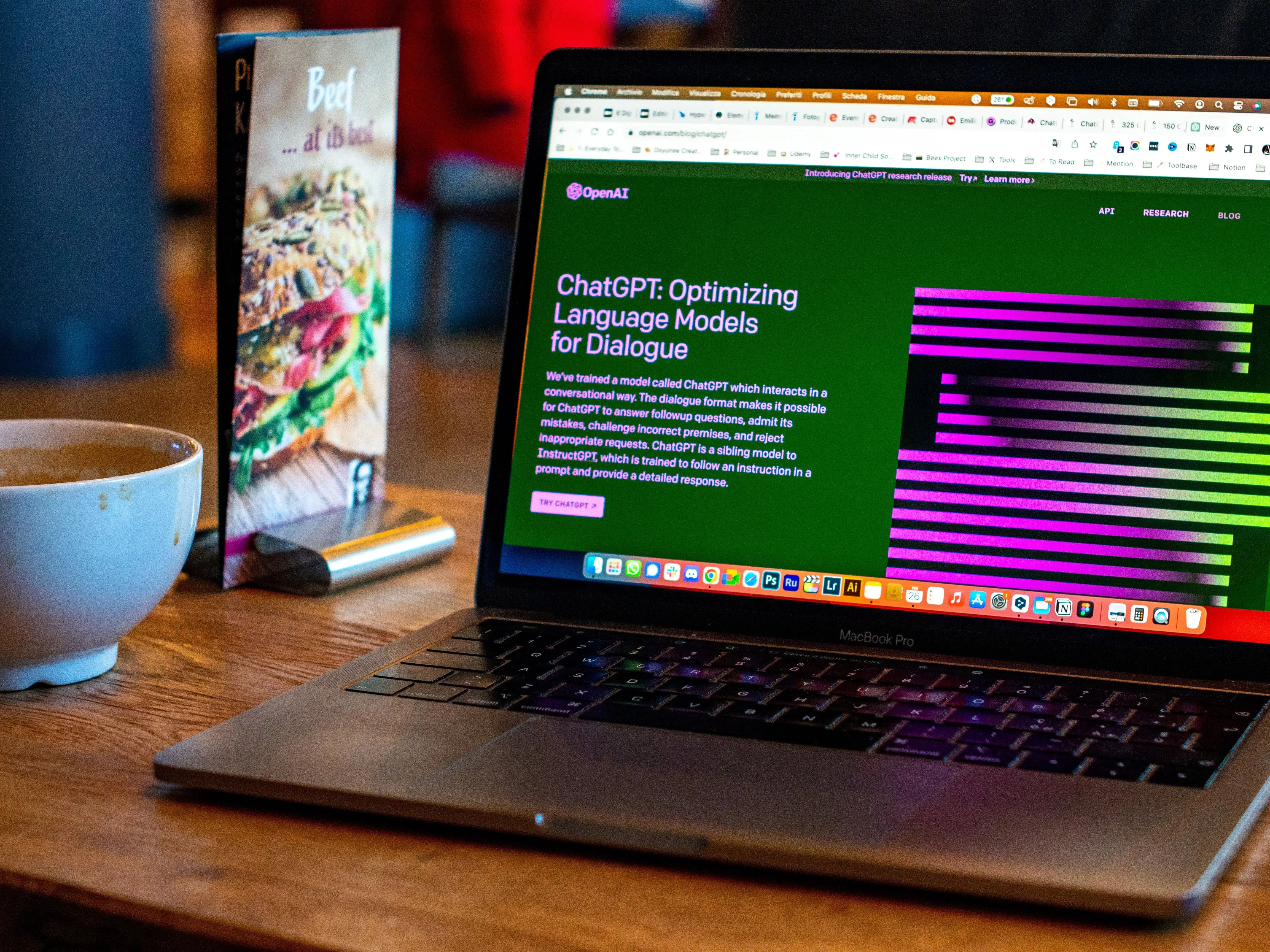
Table of Contents
Are You Still New To ChatGPT?
In case you have not visited ChatGPT till now you can access the free version here.The interface is clean and simple. There is a place holder at the bottom of the page where you enter your prompts and the AI generates the reply below it. The scroll bar on the right helps you to navigate up and down to view the chats in your present conversation.
You will need to sign up with your email id to register with OpenAI the creators of ChatGPT.
From the top left hand corner you can start a new chat. All your previous conversations are visible below the new chat tab. Some handy utilities like deleting previous conversations, dark mode and logout are added to the button left panel.
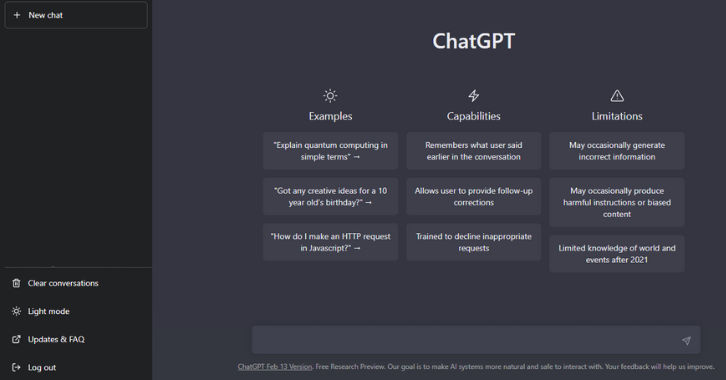
ChatGPT Case Study
Case 1
Some weeks back I thought of getting a blogpost written by ChatGPT.
The prompt was as follows:
Write a blog post of around 1200 words on Free Chrome Extensions which are alternative to ChatGPT. Summarize their features and how they can assist in work. Also mention the cons if any for the respective extension. And mention the applications which have a completely free plan. Some of the extensions are Writesonic, Zoho, WebChatGPT, ChatGPT for Google, ChatGPT Writer, Merlin, WritingMate, Perplexity. You can add a few more if they are relevant. Include a table of contents and an introduction with a small story to grab the attention of the reader. In conclusion, specify the advantages of these tools.

I am aware that there are typo and grammatical errors in the prompt. Excuse me! as I wasn’t planning to make a case study out of it back then.
Why did I choose this example for the Case Study?As a lay person I thought that ChatGPT must have more information about itself than anything else.
Below are the screenshots of three variations of the reply to the same prompt. You can download the pdf transcripts of the Responses for a clearer view.
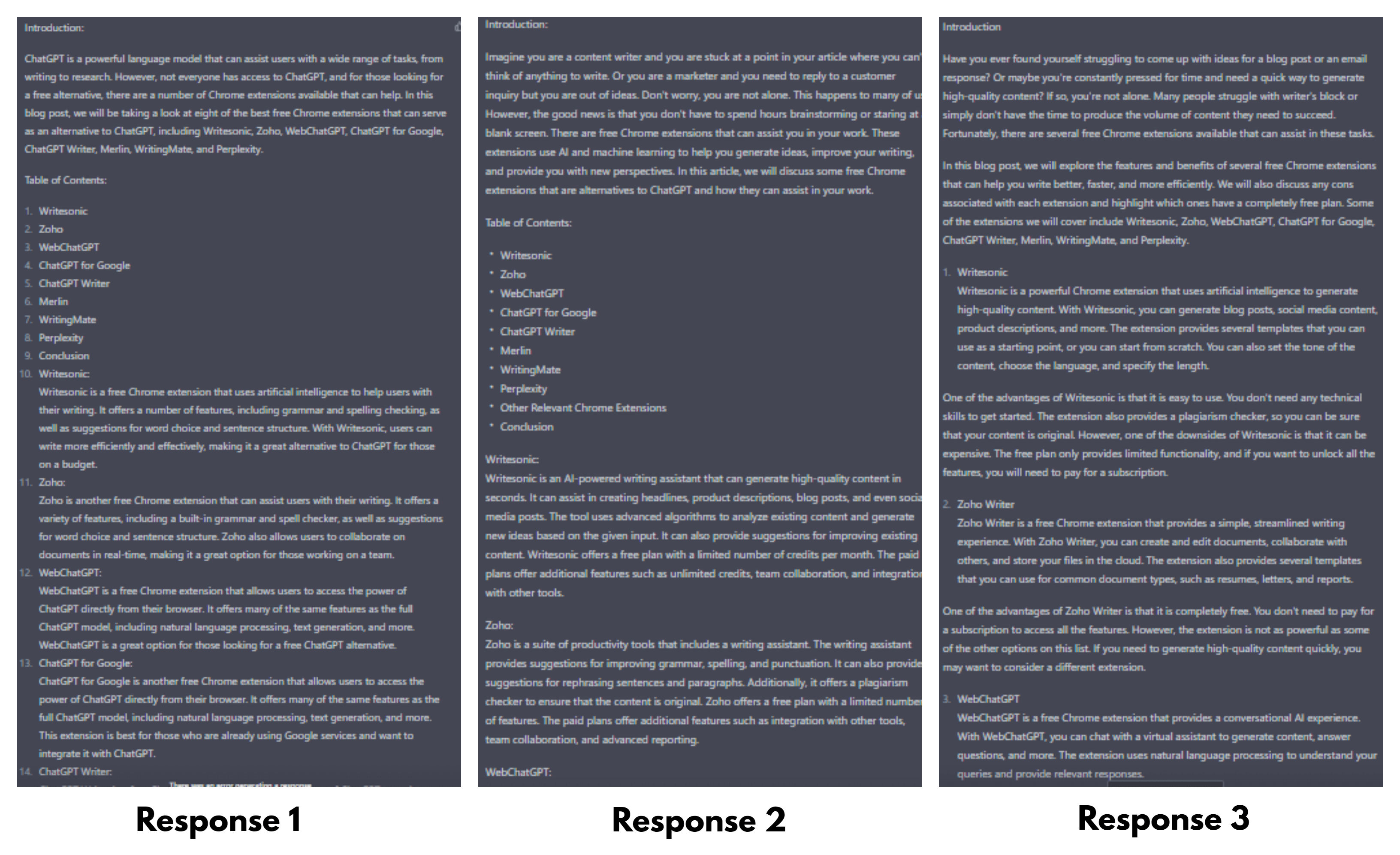
You can see that the style and tone of writing is almost the same. I noticed that the introduction to any topic follows a common path with a few variations here and there. The beginning of the sentences describing the primary content show the same pattern and the descriptions are also not creative.
Further reading gave me the impression that the article was written primarily to fulfil the 1200 word target. The total word count was however 770 and not 1200.However there is one thing to take into account, response 2 and 3 was regenerated after a few weeks of response 1. Response 2 shows a significantly different style of writing for the exact same query.
You will also notice that ChatGPT did not add any more extensions. This means that either I have added all the relevant extensions in existence or ChatGPT has limited access to information. The first option cannot be true, so….. You guessed it right.
Data is fed to ChatGPT from time to time. It does not have autonomous access to data or information on the internet in real time. So whatever content it generates, ChatGPT has to rely on the data that has been provided to it by its developers.The OpenAI team has clearly stated this in their FAQ.

The full form of GPT in the context of “ChatGPT” is “Generative Pre-training Transformer”. Since this AI is a generative language model, It’s primary function is to respond back to queries in a conversational way that humans can understand easily without having to process further.
The model is generative, so it is actually learning and improving itself through interactions. In this process it may generate responses which are not factual and irrelevant to the context of the query.
There is also a request from OpenAI to down-vote a wrong answer to improve the ability of ChatGPT.
How original is the generated content, let’s check?
I have used a plagiarism checker and measured the readability score with free tools available online.

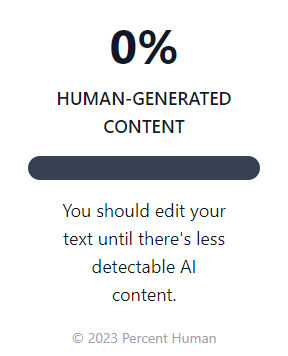
You can see that the free plagiarism checker tool has not detected any plagiarised content in this response. But the robotic text analyser, Percent Human has flagged the content to be AI generated. And finally the Flesch Reading Ease score is 50.05, which means that the text is moderately difficult to read.

Many people have questioned the data policies of AI generated content in the light of the copyright act. Besides you should be aware that when using ChatGPT you are granting OpenAI the permission to access the generated content (input and output) for research purposes.

Case 2
There is one more conversation where I asked ChatGPT, whether it was aware about the recent earthquakes (6th February 2023) that happened in Turkey. The AI referred to the earthquakes which occurred in 1999.

The response generated above is not the fault of ChatGPT but how the developers want it to be. As you know by now that this version of ChatGPT -3.5 does not have real time access to the internet so it cannot be factually correct for each query. But the underlying logic of continuing a conversational chat makes it pursuant to seek a reference and come up with the 1999 earthquake as an answer.

The above transcript with ChatGPT clearly mentions that it cannot provide information after September 2021.So you can be pretty sure that for now if you put forward any query to ChatGPT whose answers lie in data after its feed time, it can generate an irrelevant or out of context answer.
But when you input a prompt that has no reference data, then ChatGPT may generate a concocted story which may be both factually and contextually incorrect. The AI term for this scenario is “Hallucination.”
Update: As of 27 September 2023 Sam Altman tweeted that ChatGPT can access the internet now and provide answers in real time while citing the sources.
ChatGPT can now browse the internet to provide you with current and authoritative information, complete with direct links to sources. It is no longer limited to data before September 2021. pic.twitter.com/pyj8a9HWkB
— OpenAI (@OpenAI) September 27, 2023
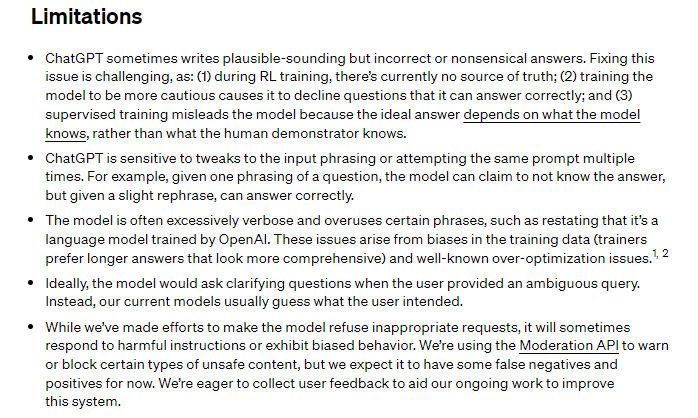
So it is up to you to verify the originality, relevance and authenticity of the information generated by ChatGPT. This information about the last updated feed can be accessed from the FAQ section of the ChatGPT interface, or you may even ask ChatGPT of the same.

Case 3
Now coming to coding. I am not a student of software and have no knowledge of any coding language. So why not take the help of ChatGPT, that’s what I thought.
I wanted a few banners displayed in rows and columns on a page so that they look decent to our viewers. Here is the result.

In my opinion that is a decent job by ChatGPT, but had I known coding I could have customized it further.
Questions I came across on the internet
The first two questions have been covered in detail and to some extent the third question too has been answered. You can use ChatGPT to generate any form of written content like letters, essays, resume, questions, answers, articles, jokes, script and much more in 95 languages. The preferred language is English though.
This AI tool can generate software code in different programming languages like Python, Java, C++, PHP, and many others.
And, how can you forget to chat with ChatGPT, it will lose the significance of its name then.
The fourth question about ChatGPT versus Bard is irrelevant from my stand point. AI is in development and deployment mode and whichever AI tool I can lay my hands on with ease to get my work done fast will be my priority.
Let me ask ChatGPT the answer to the fifth question. What do you say folks?
Let’s see what ChatGPT has to say.
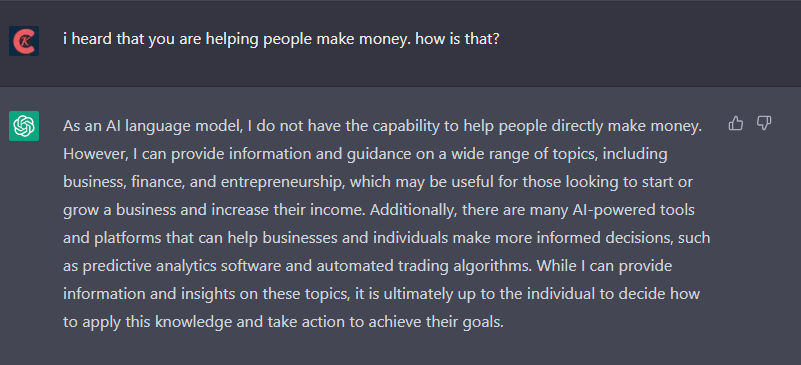
Basically ChatGPT is a tool, and a complex one. And this tool can assist you to learn, increase productivity & make money but, you have to put the learnings you obtain from ChatGPT into practice in the real world. There is also a suggestion from ChatGPT, to consult other AI tools which are designed for specific tasks related to making money.
But finally what ChatGPT says is very important to remember. Your success in making money ultimately depends on you.
My answer to the sixth question (Will ChatGPT take away employment?) is both Yes and No.
Yes, because this technology has just been released, it has the potential to scale up and find usage in enterprises and mass scale solutions which can benefit and replace human workforce in certain areas. No, because at present the content that you get from ChatGPT has been generated by some human being, sometime in the past. By the time AI solutions will be used by the masses, the work that we do today will also change.
You can relate it to the scenario after finding petroleum. The way transportation changed and along with it grew new avenues of opportunities.
So, since change is the only constant we have to adapt to change.
Final Thoughts
To help ChatGPT to provide more accurate and up-to-date information you have to provide a specific context, be specific in your questioning, provide a knowledge cut-off date and verify the information that it generates. All of these points apply if you are looking for some specific answers.
Before closing this this post I want to emphasise that ChatGPT is not the first AI tool in our hands. We have already been using AI for quite some time now, maybe even without realising it. Google, Siri, Alexa are just a few common names where AI is in use.
However, ChatGPT from OpenAI, has shown us that using AI tools can become more convenient, just like interacting with another person. The present use of ChatGPT has also broadened the scope of actualizing the implementation of AI in other general spheres of life.
Through collaboration and by cautiously treading on the doubly-edged, ambition-competition scale I am hopeful enterprises will come up with new tools to benefit humankind.




